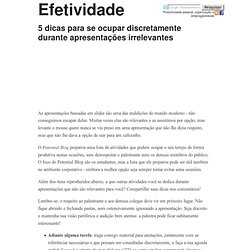

42 Ways to Make People Like and Respect You. We all want to be liked, yes. But—perhaps more importantly in the workplace—we all want to be respected. Respect is so important when it comes to your career development. It comes into play when the higher-ups are considering your ideas, when they’re choosing people to participate in projects, and—yes—when they’re thinking about who’s getting promotions or raises. But too often people associate earning respect with, well, not being very nice. We’re here to tell you that’s not often the right approach. 1. How to Know If You Talk Too Much. We hope the conversations that take place on HBR.org will be energetic, constructive, and thought-provoking.

To comment, readers must sign in or register. And to ensure the quality of the discussion, our moderating team will review all comments and may edit them for clarity, length, and relevance. Comments that are overly promotional, mean-spirited, or off-topic may be deleted per the moderators' judgment. All postings become the property of Harvard Business Publishing. Waste Less of Your Time in Meetings with the 10-30-50-90 Method. A Geometria da Boa Reunião. A Geometria da Boa Reunião Regras Básicas Para Um Uso Eficaz do Tempo Carlos Cardoso Aveline Há pelo menos quatro motivos pelos quais as reuniões são fatores decisivos na vida de quase todo cidadão.

The Collaboration Paradox: Why Working Together Often Yields Weaker Results. On a midsummer afternoon in 1957, a church fundraiser altered the course of music history.

It was just after 4:00 when a group of teenagers took the stage. Rumor has it the boys were so anxious about playing in front of their neighbors, they downed a few beers before launching their set. 5 dicas para se ocupar discretamente durante apresentações irrelevantes. As apresentações baseadas em slides são uma das maldições do mundo moderno - não conseguimos escapar delas.

Muitas vezes elas são relevantes e as assistimos por opção, mas levante o mouse quem nunca se viu preso em uma apresentação que não lhe dizia respeito, mas que não lhe dava a opção de sair para um cafezinho. O Potential Blog preparou uma lista de atividades que podem ocupar o seu tempo de forma produtiva nestas ocasiões, sem desrespeitar o palestrante nem os demais membros do público. O foco do Potential Blog são os estudantes, mas a lista que ele preparou pode ser útil também no ambiente corporativo - embora a melhor opção seja sempre tentar evitar estas ocasiões.
The Art of Feedback: Striking a Balance Between Guidance and Criticism. How to Be Assertive. The art of meaningful conversation An Introvert's Guide to Networking. Every week, I get invited to another “must attend” business event sure to be full of important people who could affect my business.

I know I should go, but it’s a chore. All too often, I end up standing in a corner clinging to the one person I know, feeling guilty that I’m not taking advantage of the situation. Recently, I attended a business women’s networking breakfast, held in a large warehouse near the waterfront. I marched through the door and collected my name tag to confront a roomful of 1,200 colorfully dressed, high-energy women chattering. Everyone appeared to be having a great time, making connections. What next? I suspect that many of us struggle at these events, but few admit it.
How to Get People to Like You: 7 Ways From an FBI Behavior Expert. Before we commence with the festivities, I wanted to thank everyone for helping my first book become a Wall Street Journal bestseller.

To check it out, click here. On How to Disagree. We live in a world saturated with disagreement.

People are at odds about pretty much everything from when to order a taxi, go out to dinner to whether there should be a caliphate; from the kind of orbit the International Space Station should assume; the right way to cook lasagna to whether Hungary is in Eastern or Central Europe, and how long a child should be allowed to play Minecraft on a Saturday morning. While disagreement can be civilised, interesting and productive, it is much too frequently a powerful source of misery: we get enraged and bewildered; we are appalled at the views of others and feel intensely bothered by them; we feel defeated, hopeless and lonely; we agonise, rehearse the conflict alone in our heads, worry, feel guilty, get upset… Disagreement is especially pressing now, because of certain large societal forces that have been building for the last couple of centuries. 1.
Politics The developed world is now democratic. 2. There is also the issue of hierarchy. 5 Steps for Dealing With People Who Talk Too Much. Go Beyond Simple Networking and Organize Your Own Mastermind Group. Toolkit - Networking for the Shy Entrepreneur. The One Conversational Tool That Will Make You Better at Absolutely Everything.
Hi 1) @LoneTruth look for 1) 2) @tearsana look for 2) 3) @TheRab and @Truefire guess (did you not see ChillyPepperz reply?)

(Ex 1: please see further below. How To Exit A Conversation. We’ve talked about making yourself more approachable and initiating conversation.

Now, hopefully, you’ve gone and got yourselves into some conversations you wish you hadn’t. There are 3 reasons you might stay in a conversation that you want to leave: You’re too polite – Many of us feel like it’s rude to leave someone alone after talking to them for a few minutes. It isn’t. Como se livrar de conversas chatas, em 10 lições. No primeiro ano do Efetividade.net, eu escrevi o artigo "5 dicas para se ocupar discretamente durante apresentações irrelevantes", e acredito que seja um dos que eu mais tenho colocado em prática no dia-a-dia.

O número de apresentações só aumenta, e a soma total da relevância delas é constante, o que traz como conseqüência um número cada vez maior de apresentações nas quais acabo tendo de estar presente, mas que pouco me interessam, ou me interessam apenas durante breves 4 minutos - embora exijam minha presença por uma hora. As dicas para se ocupar discretamente funcionam bem em apresentações, mas em geral não podem ser aplicadas a uma outra situação comum: estar preso a uma conversa (em duas pessoas ou num pequeno grupo) que não lhe interessa.
Four Ways to Make Difficult, Serious Conversations More Productive.